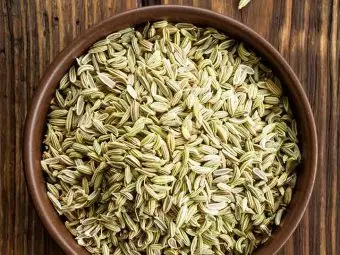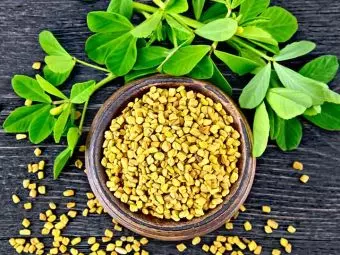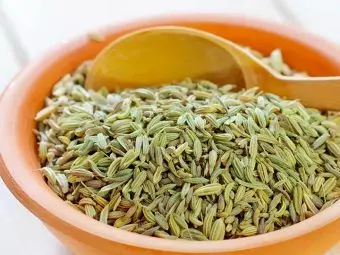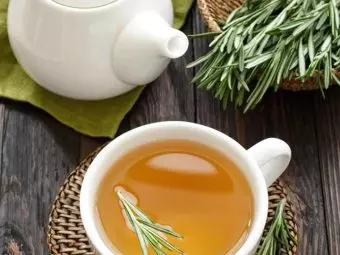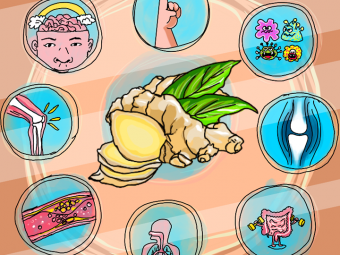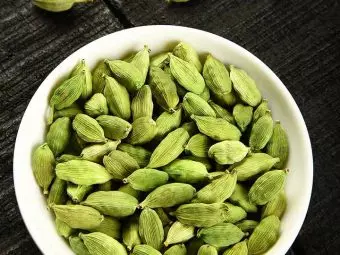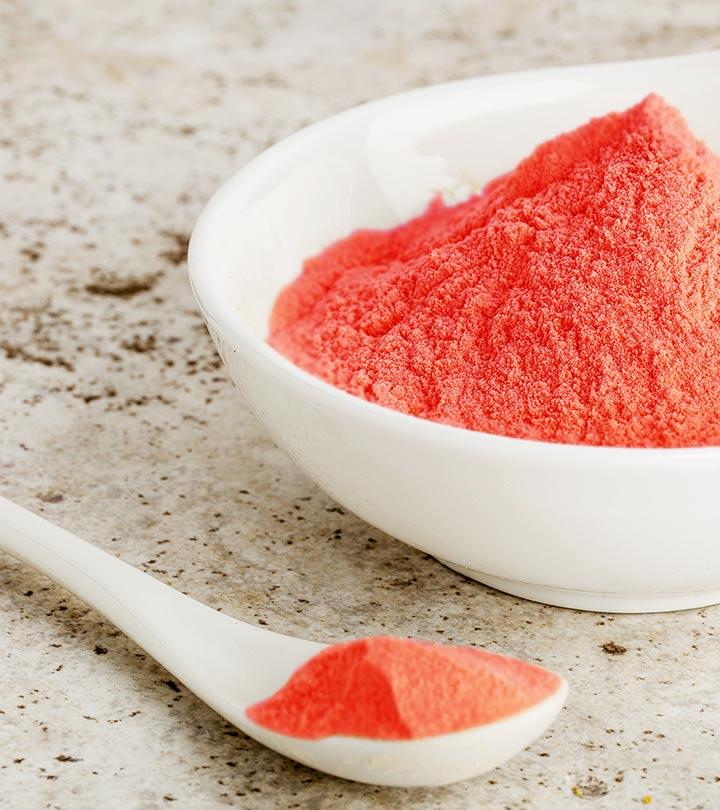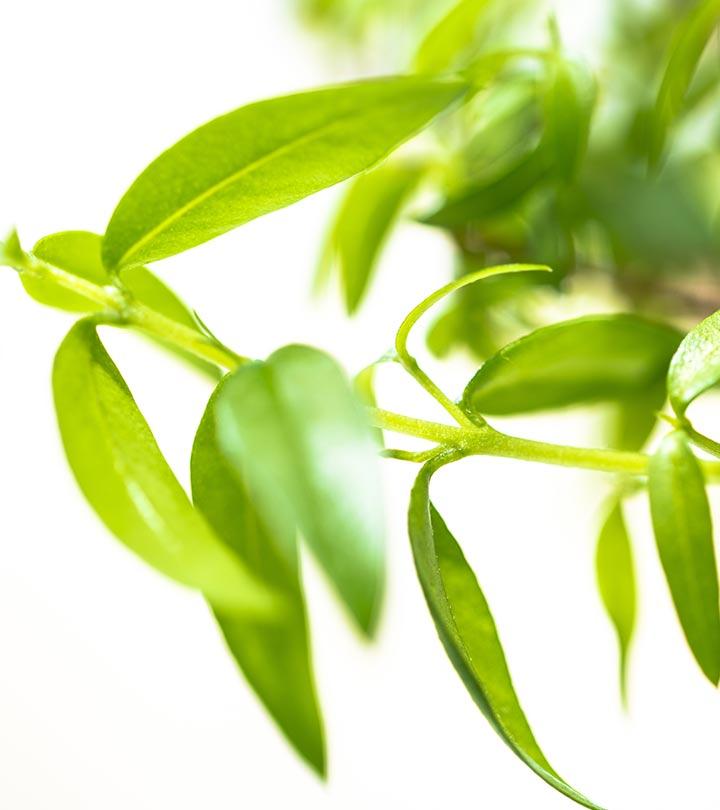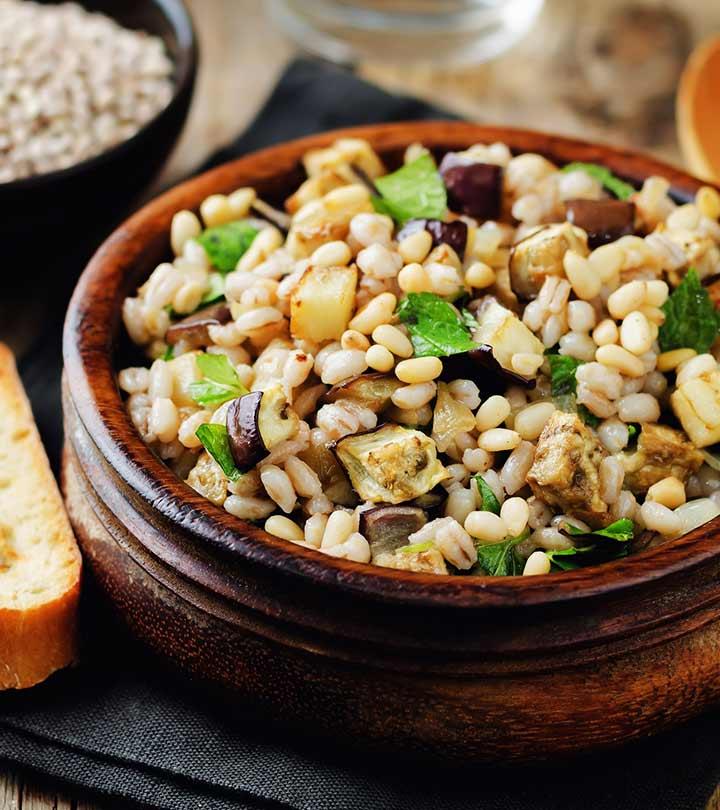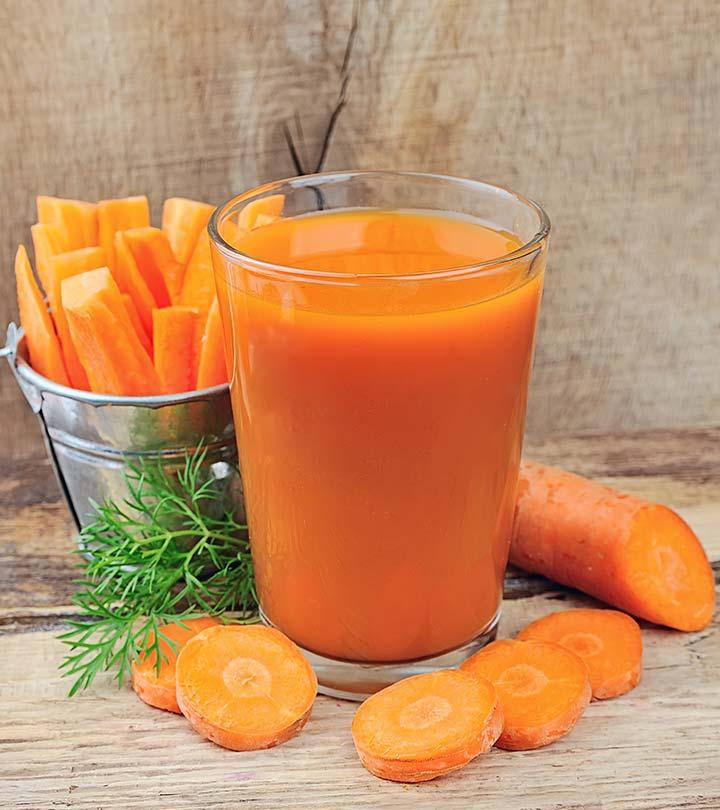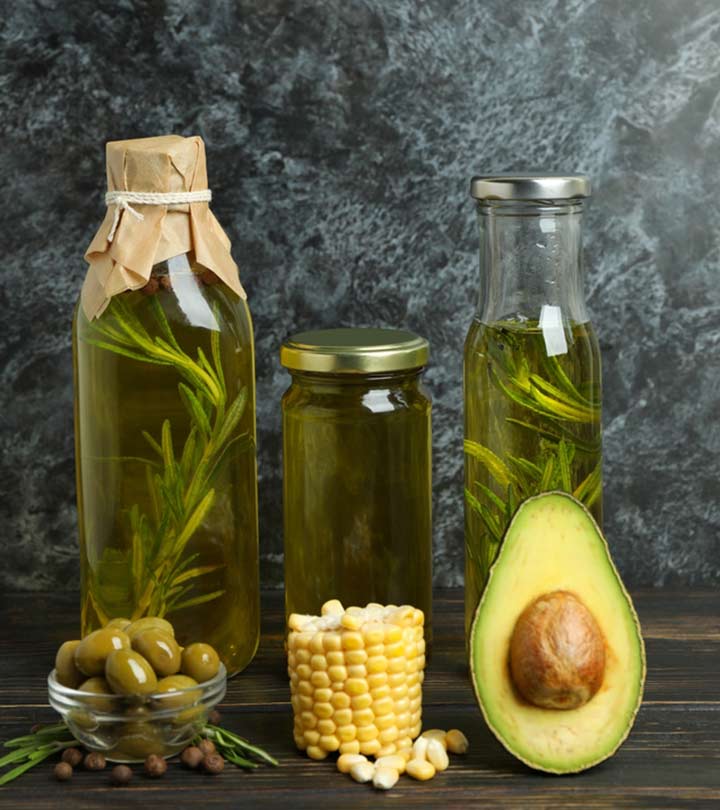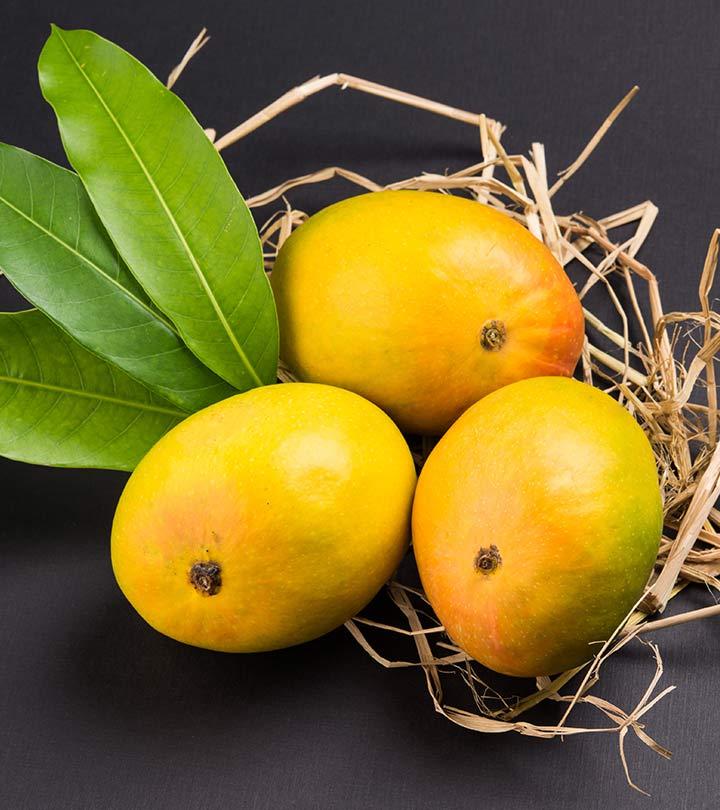16 Powerful Fennel Tea Benefits You Must Know
Experience the power and goodness of consuming this medicinal spice tea every day.
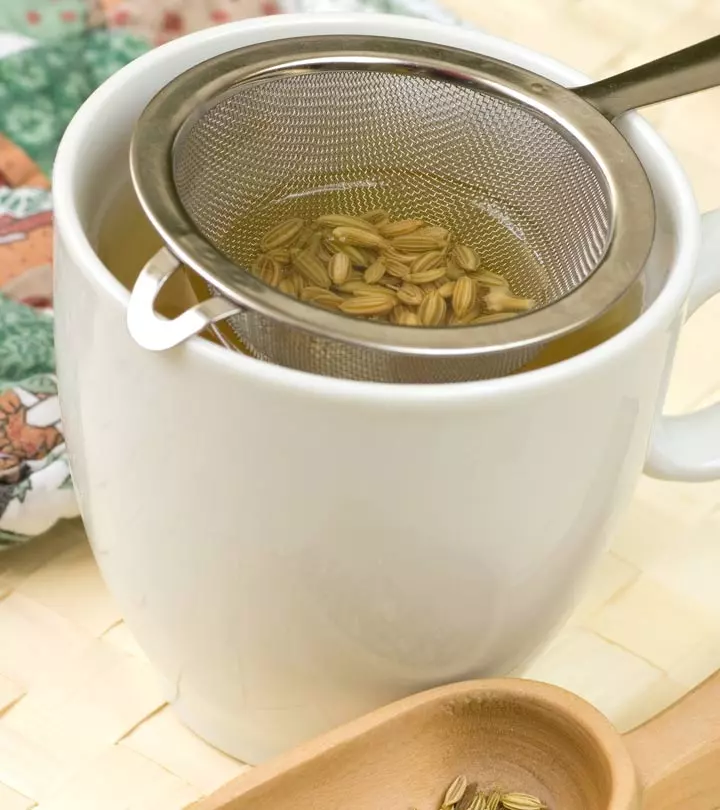
Image: iStock.com
Fennel tea benefits have been known since ancient times. This spice features predominately in Asian and Middle Eastern cuisine. It is renowned for its medicinal and culinary applications.
The brownish-green fennel seeds are steeped to make the tea. This tea is packed with the goodness of fennels. It contains potent antioxidants and nutrients such as vitamins A, B-complex, C, and D, among other beneficial bioactive compounds.
Fennel tea can help manage weight and promote digestion. Drinking water-based fennel tea first thing in the morning helps with bodily hydration. It may also help boost heart, gut, eye, and gum health and general wellness. This article discusses the importance of fennel tea, its benefits, its recipe, and possible side effects. Take a look.
 Know Your Ingredient: Fennel Tea
Know Your Ingredient: Fennel TeaWhat Is It?
A yellow liquid made from dried fennel seeds and hot water with a licorice flavor.
What Are Its Benefits?
It boosts immunity, reduces blood sugar levels, and aids in weight loss.
Who Can Consume It?
Anyone can consume this except people on antibiotics and blood thinning medications.
How Often?
You can drink one to two cups a day.
Caution
Avoid drinking fennel tea if you are pregnant or breastfeeding. Excess consumption may lead to loss of appetite, swelling, and dizziness.
In This Article
16 Powerful Fennel Tea Benefits You Must Know
- What Is Fennel Tea?
- What Is Fennel Tea Good For?
- Fennel Tea Benefits
- How To Make Fennel Tea
- Fennel Tea Recipes
- Where To Buy Fennel Tea
- Fennel Tea Side Effects
What Is Fennel Tea?
Scientifically known as Foeniculum vulgare, fennel is an aromatic plant (from the carrot family) used for both medicinal and culinary purposes. Native to the Mediterranean, it is now found all over the world. Fennel seeds have an anise-like flavor. The seeds and its oil are used to make medicine.
It was used as traditional medicine in India, China, and the Middle East, and today, its use has spread across the world. Ancient Greek doctors suggested fennel tea for breastfeeding mothers in order to promote breast milk supply.
 Trivia
TriviaFennel tea is prepared by simply boiling fennel seeds in water, in such a way that the volatile oils also blend well with the water. And yes, as we will see, the tea is extremely good for you.
But why?
What Is Fennel Tea Good For?
There are numerous fennel tea health benefits. It contains various antioxidants and other compounds that are extremely beneficial. A few of its benefits include improved digestive functioning and enhanced immunity and eye health.
In fact, the health properties of fennel tea were so popular that in countries like India and China, it was used to treat snake and insect bites. Back in ancient Greece, Olympic athletes used fennel to enhance stamina and promote longevity.
Rich in vitamins A, B-complex, C, and D, amino acids, and numerous other nutrients, fennel, undoubtedly, is one ingredient we all must include in our diet.
Now, we come to the health benefits of fennel tea – in greater detail!
Fennel Tea Benefits
1. Treats Gastrointestinal Issues And Improves Digestion
Fennel seeds are known to relax the muscles and stimulate the flow of bile, which eventually reduces pain – this can eventually improve digestion. Fennel is one of those herbs that has digestion-enhancing properties (1).
Fennel also expels gas from the body and relieves bloating. It encourages blood circulation to the digestive tract, thereby improving the overall digestive process (2).
According to traditional Persian scholars, fennel is one of the few herbal compounds that can help relieve flatulencei XThe condition where gas gets accumulated in the alimentary canal and is then expelled through the anal passage. (3). And numerous medical studies have proven fennel’s ability to improve the health of the gastrointestinal tract. As it is a good source of fiber, it keeps the large intestine and colon healthy (4). Fennel also is one of those spices that helps relieve gut-based functions like gas production, eases digestion, and promotes detoxification (5).
Though there is substantial evidence, there is anecdotal proof to support that fennel tea can alleviate IBS (irritable bowel syndrome) symptoms (6).
2. Aids Weight Loss
Wondering, how fennel tea benefits weight loss? Well, yes it does! It all boils down to fennel’s ability to aid digestion. Improved digestion enables your body to assimilate nutrients better. This keeps you satiated and reduces cravings. Ultimately, this helps in weight loss.
Barbara Kovalenko, a nutrition consultant, says, “There is limited scientific evidence to support the claim that fennel tea reduces belly fat, but it may aid in digestion and improve overall health, which can lead to weight loss.”
Fennel is also considered a hot temperament herb, and it helps decrease serum glucose levels and promotes weight control in humans (7). It also suppresses appetite and helps get rid of excess fluids and waste from the body (8).
3. Helps Treat Respiratory Ailments
An Egyptian study states that fennel has been used for centuries for curing respiratory disorders. The herb is also used for treating catarrh (excessive build-up of mucous) in the upper respiratory tract (9).
Fennel also helps in calming spasms in the respiratory system. It cleanses the bronchial passages and keeps respiratory ailments at bay. Also, fennel is extremely good for the lungs (10).
In a study conducted by the Ontario Veterinary College, a herbal composite containing fennel was found to alleviate the symptoms of respiratory dysfunction in horses (11). Similar results were found to be possible in humans.
Another Portuguese study recommends fennel for the treatment of respiratory conditions like bronchitis and chronic coughs (12).
4. Promotes Heart Health
There is a link between liver and heart health, which most of us are unaware of. The liver is where cholesterol is produced and broken down. A healthy liver breaks the cholesterol down more efficiently and regulates it as well. Fennel is one food that supports liver functioning and indirectly promotes heart health (13).
Fennel is also an excellent source of fiber. Fiber prevents cholesterol re-absorption and offers protection against heart diseases.
Fennel, being an excellent source of potassium, helps control blood pressure and counteracts the undesirable effects of sodium. This prevents hypertension and, eventually, heart disease.
5. Boosts The Immune System
Fennel is an excellent source of vitamin C, a powerful antioxidant that strengthens the immune system. Fennel also contains selenium that can stimulate the production of T-cells (T-cells are active participants in the immune response).
Fennel also possesses antimicrobial properties, which further help enhance immunity.
6. Promotes Eye Health
Extracts of fennel seed have been found to be potentially useful in treating glaucomai XA condition in which the pressure in the eyeballs increases, damaging optic nerves and leading to gradual loss of sight. (14). You can use fennel tea either as an eye tonic – apply directly as eye drops or as a compress.
As per an Iranian study, fennel extracts are beneficial in improving vision (15). Vitamin C, one of the nutrients fennel is very rich in, plays a major role in protecting the eyes (16). As the eyes have a higher metabolic rate, they have an additional need for antioxidant protection – which is readily offered by fennel due to its high vitamin C content.
Lower levels of vitamin C in the eye lens can increase the risk of cataract formation (17). The antioxidants in fennel shield the eyes from effects of macular degenerationi XAn eye disease common in older people that causes loss of sight at the center of the field of vision. (18). There are certain individuals who wash their eyes with fennel tea to treat conjunctivitis.
Fennel can also be used to treat eye inflammation (19).
7. Improves Hormonal Balance
Fennel is one of the foods containing phytoestrogens, which, according to an Italian study, promote hormonal balance (20). As per another American study, fennel seeds demonstrated significant ability to treat PCOS (polycystic ovary syndrome), which is a hormonal disorder most prevalent in women of reproductive age (21).
The phytoestrogen content in fennel is what makes the herb ideal for reducing the symptoms related to hormonal imbalance (22). Fennel also contains phytohormones that help regulate the body’s own hormones and prevent any potential imbalances.
Progesterone is the most important hormone when it comes to balancing the thyroid and the glandular system. And fennel possesses progestogenic substances that aid in this regard (23).
8. Helps Relieve Arthritis
In one study, certain inflammatory ailments were found to respond well to fennel. The herb also increases the activity of an antioxidant named superoxide dismutase, which contributes to reduced levels of inflammation.
As per a Mumbai study, fennel is one of the herbs that is extensively used to treat arthritis symptoms (24). In another Iranian study, fennel had shown excellent osteoprotective propertiesi XThe property of a substance to protect bones from physical damage and aid in their restoration or remodeling. (25).
9. Helps Cope With Menstrual Problems
According to Barbara, “Fennel tea has been traditionally used to relieve menstrual cramps and other symptoms associated with painful periods, and some evidence suggests that it may have pain-relieving properties. Some people may find fennel helpful for managing anxiety and stress, but more research is needed to confirm its effectiveness in this regard.”
Certain studies suggest the efficacy of fennel in treating painful menstrual cramps (26). Fennel tea can also help regulate your thyroid so that you can have a healthy flow.
In a 2002 Iranian study, high school girls suffering from menstrual pain had reported major improvement in the condition after having taken fennel extract (27). In another placebo-controlled triali XA trial conducted on two or more groups where one group gets active treatment while the others get the placebo or inactive treatment. , fennel was found to significantly reduce menstrual pain (28). Another Iranian study had stated that the intake of fennel can alleviate menstrual symptoms like nausea and weakness (29).
Menstrual pain, according to certain studies, is probably caused by excessive contraction of the uterine muscles that leads to blood reduction. Fennel has been found to relax these muscles, thereby healing the symptoms.
10. Promotes Gum Health
Fennel, being an excellent antimicrobial agent, aids the treatment of gum inflammation (30).
11. Fennel Tea For Babies
As per the University of Maryland Medical Center, fennel tea can help reduce colic symptoms. This is because the herb has soothing effects on the gastrointestinal tract and expels gas (31). Fennel can lead to the relaxation of a baby’s intestines. However, as per studies, the herb is not recommended for infants below 4 months of age.
According to an Italian study, fennel infusions help prevent flatulence and colic spasms in babies (32).
However, fennel has been found to be unsafe for babies in a couple of instances. Please consult your doctor before using fennel tea for newborn.
Stephanie Portell, an ER nurse and life coach, shared how drinking a nourishing herbal infusion, water, and fennel-fenugreek tea ensured rich and abundant lactation post-delivery. She said, “This was essential to establishing my milk supply and keeping both baby and I well hydrated, nourished, and rested (i).”
12. Helps Kill Internal Parasites
Fennel is considered a botanical dewormer, and it can be used to eliminate internal parasites (33). Fennel tea has laxative properties that promote intestinal movement, and this helps flush the worms out of your system. Fennel seeds are also believed to act as a sedative for worms. Certain studies assume that worms cannot lay eggs when in a state of rest, and hence, fennel keeps them from multiplying.
13. Helps Treat Diabetes
In an Indian study, fennel was one of the 10 foods found to have properties that alleviated diabetic complication (34).
In another published study, 250 milligrams of fennel had considerably lowered blood glucose levels in the rats that were tested upon, indicating similar possibilities in humans.
Fennel, being a good source of vitamin C, can also help diabetics. A high intake of the vitamin might lower the blood sugar levels in people suffering from Type 2 diabetes.
One of the medications given to people having high blood sugar levels is Gluconorm-5, and one its constituents is fennel. The glucose-lowering effect of Gluconorm-5 is believed to be the result of certain ingredients, with fennel being one of them (35).
Fennel, like other non-starchy vegetables, has a low glycemic index. This makes the herb more conducive to blood glucose control and a beneficial food in the diabetic diet (36). Both the vegetable and its seeds contain certain chemicals that can act against diabetes.
Another reason fennel is a diabetes superfood is its potassium content. Potasisum has been found to increase insulin sensitivity, and is hence recommended for diabetics (37).
According to the University of Maryland Medical Center, a large clinical study done on more than 2,000 people had found that adequate levels of magnesium in the diet can offer protection against Type 2 diabetes. Fennel is a magnesium-rich food, and hence can be quite helpful in this regard (38).
14. Helps Prevent Cancer
As per an American study, herbal supplements with fennel as one of the ingredients have the potential to protect against prostate cancer (39). Fennel tea is a multicomponent mixture containing various antioxidants that protect against cancer (40).
Fennel contains numerous bioactive compounds, including quercetini XA plant pigment with antioxidant properties that may help protect against cancer and heart conditions. , which had shown anticancer activity (41). Fennel also possesses excellent anti-inflammatory properties that can be attributed to a phytonutrient called anethole. This compound, apart from hindering inflammation, also prevents the transformation of regular cells into cancerous ones.
Its richness in fiber and vitamin C make fennel an important food in cancer treatment (42). As per a report published by the Tennessee State University, fennel has been found to inhibit the growth of lung cancer cells and colon cancer cell lines (43). Fennel also limits the activity of a protein called NF kappa B, which is responsible for numerous inflammatory diseases, including cancer (44).
Fennel is also found to have remarkable anticancer potential against breast and liver cancer cells (45). The antioxidants in fennel, along with the fiber, help cleanse the colon and prevent colorectal canceri XA term for colon cancer that combines colon and rectal cancer. It begins in the rectum, situated at the lower end of the digestive tract. (46).
15. Fennel Tea Benefits For Men
Fennel is known as a libido-booster and can improve sexual desires, specifically in men. It can also relieve issues related to the bladder and prostate like prostate cancer as well as prolong orgasms (47).
16. Helps Treat Acne
Fennel contains certain essential oils like anethole, myrcene, and limonene – all of which have exhibited anti-inflammatory properties with a potential to treat skin conditions like acne. Fennel also helps flush out the excess liquids from the skin, which might otherwise contribute to acne. The antibacterial and antioxidant properties of fennel also may help prevent acne formation (48).
That is with the fennel seed tea benefits. But what about the dosage? How much of fennel can you take in a day?
Dosage
Ideally, you can use 5 to 7 grams of fennel seeds in tea per day. A dosage of 500 mg/kg can lead to adverse effects like piloerectioni XThe bristling of hair caused by involuntary muscle contraction at the base of hair follicles. It is the medical term for goosebumps. and loss of appetite (49).
How To Make Fennel Tea
Here’s the process for making fennel tea at home:
What You Need
- A bag of fresh fennel seeds, preferably with a high volatile oil content
- A little amount of honey
Directions
- Crush 1 to 2 tablespoons of the seeds. You can use a pestle and mortar for this purpose.
- Add the crushed seeds to a large mug and add hot water to it. Ensure the water is not boiling hot.
- Cover the jug and steep for about 10 minutes.
- Strain the liquid and enjoy the tea. You can add a small amount of honey if you want.
Fennel Tea Recipes
1. Cumin Coriander Fennel Tea Recipe
What You Need
- 1 ½ cups of water
- 2 teaspoons of fennel seeds
- 2 teaspoons of coriander seeds
- 2 teaspoons of cumin seeds
Directions
- Add 1 1/2 cups of water in a saucepan and boil
- Add the whole coriander, cumin, and fennel seeds.
- Cover it. Let it steep for 5 minutes.
- Strain and serve.
2. Peppermint And Fennel Tea Recipe
What You Need
- 2 teaspoons of peppermint leaves
- 1/2 teaspoon of fennel seeds
Directions
- Crush the seeds, and add the ingredients into a glass jar.
- Pour a cup of hot water to the jar.
- Cover it. Let it steep for 5 minutes.
- Serve.
3. Fennel and Ginger Tea Recipe
What You Need
- 2 teaspoons of fennel seeds
- 1 teaspoon of fresh grated ginger
- 1 teaspoon of dried lemon verbena
Directions
- Crush the fennel seeds to release their volatile oils.
- Add the ingredients to a saucepan. Add water to it and boil.
- Once the water starts to bubble, allow to simmer on low heat for about 10 minutes.
- Strain and serve.
4. Fennel And Chamomile Tea Recipe
What You Need
- 1 tablespoon of dried fennel seeds
- 1-2 cups of water
- 1 tablespoon of chamomile flowers
- 1 teaspoon of honey (optional)
Directions
- Add the water in a saucepan and boil on medium-high heat.
- Add the fennel seeds and chamomile flowers to the boiling water.
- Cover the saucepan and let it steep for 2-3 minutes.
- Strain and serve.
- You may add some honey for added flavor.
5. Fennel And Fenugreek Tea Recipe
What You Need
- 1 teaspoon of fennel seeds
- 1 teaspoon of fenugreek seeds
- 1-2 cups of water
Directions
- Pour the water into a saucepan and boil it on medium-high heat.
- Add the fennel seeds and fenugreek seeds to the boiling water.
- Let it simmer for 4-5 minutes.
- Strain the tea and serve.
 Quick Tip
Quick TipFennel Tea Side Effects
Let’s take a look at what actually are the side effects of fennel tea here.
1. Might Cause Sunburn
The consumption of fennel tea might increase your sensitivity to the sun. You might develop sunburn as a result.
2. Can Cause Allergies
In rare cases, fennel tea can also cause certain allergic reactions. Individuals who are allergic to carrots, mugwort, or celery are at an increased risk of developing an allergic reaction to fennel. Symptoms of an allergic reaction include dizzines, difficulty in swallowing, or even facial swelling.
3. Can Cause Reactions In Pregnant Women
Certain studies have indicated adverse reactions in pregnant or nursing women on the consumption of fennel tea. Fennel might also bring on menstruation in pregnant women and cause miscarriage. Barbara says, “Fennel should be avoided by people with estrogen-sensitive conditions, such as endometriosis, as it may affect hormones and worsen symptoms. Pregnant and breastfeeding women should also consult a doctor before taking fennel.” To be on the safer side, avoid its use if you are pregnant.
4. Might Interact With Medications
Fennel tea might also interact with certain medications and obstruct their metabolization. These include medications like ciprofloxacin and fluoroquinolone. To avoid interactions, take these medications at least two hours before you consume fresh fennel tea. Or best – avoid fennel if you are taking any of these medications.
5. Might Disrupt The Endocrine System
Fennel also contains phytoestrogens, which are a family of plant-based hormones suspected to disrupt the functioning of the endocrine system. Hence, if you are suffering from any kind of ailment related to the endocrine system, avoid the use of fennel.
6. Might Be Unsafe For Babies
One report states that two infants had suffered from neurological damage when they were administered a herbal product that contained fennel (among other ingredients). Hence, please consult your doctor before giving any form of fennel to your infants.
Infographic: 8 Effective Benefits Of Fennel Tea
The tea made from fennel seeds has many culinary and medicinal uses. India is among the countries that heavily export fennel seeds. They are well known for providing a variety of nutritional benefits that enhance health – and taking them as tea is more convenient. Take a look at the infographic below to learn more about the significant advantages fennel tea has to offer. Illustration: StyleCraze Design Team
Fennel tea benefits you in numerous ways. This tea is loaded with antioxidants, vitamins, and many bioactive compounds. Fennel tea improves digestion, and metabolism and helps in treating gastrointestinal issues, respiratory ailments, arthritis, menstrual problems, and diabetes. It promotes heart, eye, and gum health too. In addition, it reduces cancer risk and improves hormonal imbalance and immunity. You can prepare fennel tea easily at home with simple ingredients. However, excess intake may cause sun sensitivity, allergies, reactions in pregnant women, and potential drug interactions. Hence, practice caution.
Frequently Asked Questions
Is it OK to drink fennel tea every day?
Yes. You can safely drink a cup of fennel tea every day.
What is the best time to drink fennel tea?
Always drink fennel tea after meals as it aids digestion.
Does fennel tea increase estrogen?
Yes. Fennel tea contains anethole, a compound considered to be an active estrogenic agent (50).
Key Takeaways
- Fennel tea can help in reducing inflammation and improve digestion.
- Its high vitamin C content helps in boosting immunity and improving eye health.
- Fennel tea may increase sensitivity to the sun and disrupt the endocrine system.
- Pregnant women should consult a doctor before consuming fennel tea as it may cause miscarriage or harm the baby.
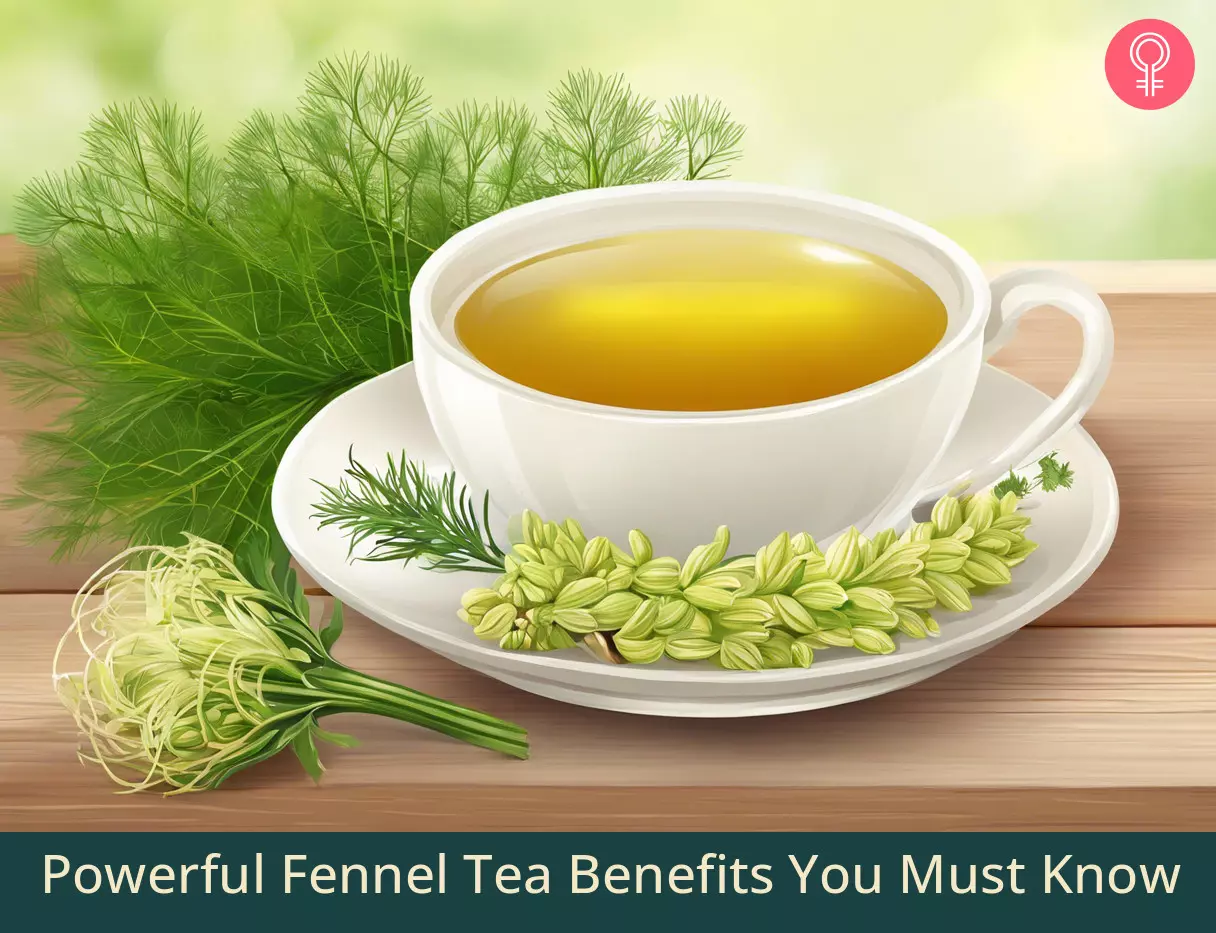
Image: Stable Diffusion/StyleCraze Design Team
Explore the astounding benefits of fennel seeds for your skin, hair, and overall health. From radiant skin to improved digestion, this video uncovers the remarkable advantages of incorporating fennel seeds into your routine.
Personal Experience: Source
StyleCraze's articles are interwoven with authentic personal narratives that provide depth and resonance to our content. Below are the sources of the personal accounts referenced in this article.
i. Creating your babymoon: A guide to a healing postpartumhttps://medium.com/@thestephanieportell/creating-your-babymoon-a-guide-to-a-healing-postpartum-64ffa10aada3
References
Articles on StyleCraze are backed by verified information from peer-reviewed and academic research papers, reputed organizations, research institutions, and medical associations to ensure accuracy and relevance. Read our editorial policy to learn more.
- Functional foods with digestion-enhancing properties
https://pubmed.ncbi.nlm.nih.gov/22010973/ - Effects of dietary fennel (Foeniculum vulgare Mill.) seed powder supplementation on growth performance, nutrient digestibility, small intestinal morphology, and carcass traits of broilers
https://www.ncbi.nlm.nih.gov/pmc/articles/PMC7847707/ - Prevention and Treatment of Flatulence From a Traditional Persian Medicine Perspective
https://www.ncbi.nlm.nih.gov/pmc/articles/PMC4893422/ - Spices fennel seed
https://fdc.nal.usda.gov/fdc-app.html#/food-details/171323/nutrients - Foeniculum vulgare Mill: A Review of Its Botany Phytochemistry Pharmacology Contemporary Application and Toxicology
https://www.ncbi.nlm.nih.gov/pmc/articles/PMC4137549/ - Factors affecting the use of herbal products in patients with Irritable Bowel Syndrome and their results: case–control study
https://www.ncbi.nlm.nih.gov/pmc/articles/PMC8817528/ - The Effects of Selected Hot and Cold Temperament Herbs Based on Iranian Traditional Medicine on Some Metabolic Parameters in Normal Rats
https://www.ncbi.nlm.nih.gov/pmc/articles/PMC3977068/ - The Effect of Foeniculum Vulgare (Fennel) on Body Composition in Postmenopausal Women with Excess Weight: A Double-blind Randomized Placebo-controlled Trial
https://www.ncbi.nlm.nih.gov/pmc/articles/PMC5770526/ - Phenolic compounds from Foeniculum vulgare (Subsp. Piperitum) (Apiaceae) herb and evaluation of hepatoprotective antioxidant activity
https://www.ncbi.nlm.nih.gov/pmc/articles/PMC3326756/ - Anti-Inflammatory and Antimicrobial Volatile Oils: Fennel and Cumin Inhibit Neutrophilic Inflammation via Regulating Calcium and MAPKs
https://www.ncbi.nlm.nih.gov/pmc/articles/PMC8545060/ - Pilot study investigating the ability of an herbal composite to alleviate clinical signs of respiratory dysfunction in horses with recurrent airway obstruction
https://pubmed.ncbi.nlm.nih.gov/17479778/ - Systematic evaluation of the antioxidant potential of different parts of Foeniculumvulgare Mill. from Portugal
https://pubmed.ncbi.nlm.nih.gov/19596397/ - The Effect of Short-term Treatment with Fennel on Lipid Profile in Postmenopausal Women: A Randomized Controlled Trial
https://www.ncbi.nlm.nih.gov/pmc/articles/PMC5949305/ - Indian traditional medicinal plants in ophthalmic diseases
https://www.ncbi.nlm.nih.gov/pmc/articles/PMC9768859/ - Persian Traditional Medicine and Ocular Health
https://www.ncbi.nlm.nih.gov/pmc/articles/PMC5087098/?tool=pmcentrez - Nutrients for the aging eye
https://www.ncbi.nlm.nih.gov/pmc/articles/PMC3693724/ - Vitamin C and the Lens: New Insights into Delaying the Onset of Cataract
https://www.ncbi.nlm.nih.gov/pmc/articles/PMC7602486/ - Eye and its health from the viewpoint of Traditional Iranian Medicine
https://www.researchgate.net/publication/335948004_Eye_and_its_health_from_the_viewpoint_of_Traditional_Iranian_Medicine - Fennel
https://www.sciencedirect.com/topics/agricultural-and-biological-sciences/fennel - Exogenous Hormonal Regulation in Breast Cancer Cells by Phytoestrogens and Endocrine Disruptors
https://www.ncbi.nlm.nih.gov/pmc/articles/PMC4153070/ - Efficacy of a Novel Fenugreek Seed Extract (Trigonella foenum-graecum FurocystTM) in Polycystic Ovary Syndrome (PCOS)
https://www.ncbi.nlm.nih.gov/pmc/articles/PMC4615243/ - Co-regulative effects of chitosan-fennel seed extract system on the hormonal and biochemical factors involved in the polycystic ovarian syndrome
https://www.sciencedirect.com/science/article/pii/S0928493120332690?via%3Dihub - Foeniculum vulgare as Valuable Plant in Management of Women’s Health
https://www.ncbi.nlm.nih.gov/pmc/articles/PMC6487283/ - Foeniculum vulgare Mill: A Review of Its Botany, Phytochemistry, Pharmacology, Contemporary Application, and Toxicology
https://www.ncbi.nlm.nih.gov/pmc/articles/PMC4137549/ - Effects of Foeniculum vulgare ethanol extract on osteogenesis in human mecenchymal stem cells
https://www.ncbi.nlm.nih.gov/pmc/articles/PMC4075705/ - Effect of fennel on pain intensity in dysmenorrhoea: A placebo-controlled trial
https://www.ncbi.nlm.nih.gov/pmc/articles/PMC3611645/ - Comparison of the effectiveness of fennel and mefenamic acid on pain intensity in dysmenorrhoea
https://pubmed.ncbi.nlm.nih.gov/17037712/ - Effect of fennel on pain intensity in dysmenorrhoea: A placebo-controlled trial
https://www.ncbi.nlm.nih.gov/pmc/articles/PMC3611645/ - The effect of fennel on pain quality, symptoms, and menstrual duration in primary dysmenorrhea
https://pubmed.ncbi.nlm.nih.gov/25085020/ - The effect of fennel (Foeniculum vulgare) gel 3% in decreasing hair thickness in idiopathic mild to moderate hirsutism A randomized placebo controlled clinical trial
https://www.ncbi.nlm.nih.gov/pmc/articles/PMC3894467/ - Treating infants’ colic
https://www.ncbi.nlm.nih.gov/pmc/articles/PMC1479474/ - Can Estragole in Fennel Seed Decoctions Really Be Considered a Danger for Human Health? A Fennel Safety Update
https://www.ncbi.nlm.nih.gov/pmc/articles/PMC3414240/ - Internal parasite management in grazing livestock
https://www.ncbi.nlm.nih.gov/pmc/articles/PMC3793100/ - Dietary sources of aldose reductase inhibitors: prospects for alleviating diabetic complications
https://pubmed.ncbi.nlm.nih.gov/19114390/ - Antidiabetic antihyperlipidemic and hepato-protective effect of Gluconorm-5: A polyherbal formulation in steptozotocin induced hyperglycemic rats
https://www.ncbi.nlm.nih.gov/pmc/articles/PMC4342645/ - Effect of dietary curries on the glycaemic index
https://www.researchgate.net/publication/49855563_Effect_of_dietary_curries_on_the_glycaemic_index - Potassium and risk of Type 2 diabetes
https://www.ncbi.nlm.nih.gov/pmc/articles/PMC3197792/ - The hepatoprotective effects of fennel seeds extract and trans‐Anethole in streptozotocin‐induced liver injury in rats
https://www.ncbi.nlm.nih.gov/pmc/articles/PMC7866591/ - Antitumor activity of herbal supplements in human prostate cancer xenografts implanted in immunodeficient mice
https://pubmed.ncbi.nlm.nih.gov/14666653/ - Fennel tea: risk assessment of the phytogenic monosubstance estragole in comparison to the natural multicomponent mixture
https://pubmed.ncbi.nlm.nih.gov/15138375/ - The Role of Herbs and Spices in Cancer Prevention
https://www.ncbi.nlm.nih.gov/pmc/articles/PMC2771684/ - Evaluation of the Anti-Metastatic Effect of Foeniculum Vulgare on the Protein Expression of HSP 70 & 90 in Balb/c Mice with 4t1 Model of Breast Cancer
https://www.ncbi.nlm.nih.gov/pmc/articles/PMC10334087/ - Network pharmacology and molecular docking reveal the mechanism of Scopoletin against non-small cell lung cancer
https://pubmed.ncbi.nlm.nih.gov/33497736/ - Fennel and fennel seed
https://www.researchgate.net/publication/305496106_Fennel_and_fennel_seed - Evaluation of the Anti-Metastatic Effect of Foeniculum Vulgare on the Protein Expression of HSP 70 & 90 in Balb/c Mice with 4t1 Model of Breast Cancer
https://www.ncbi.nlm.nih.gov/pmc/articles/PMC10334087/ - Anti carcinogenic activity of Methanolic Extract of Fennel Seeds (Foeniculum vulgare) against breast, colon, and liver cancer cells.
https://www.researchgate.net/publication/278027448_Anti_carcinogenic_activity_of_Methanolic_Extract_of_Fennel_Seeds_Foeniculum_vulgare_against_breast_colon_and_liver_cancer_cells - Foeniculum vulgare seed extract exerts anti-cancer effects on hepatocellular carcinoma
https://pubmed.ncbi.nlm.nih.gov/33502415/ - Antimicrobial and antioxidant activities of fennel oil
https://pubmed.ncbi.nlm.nih.gov/37426506/ - Assessment of the acute and subacute toxicity of the aqueous extract of Moroccan Ferula communis fruit in a mouse model
https://www.ncbi.nlm.nih.gov/pmc/articles/PMC10415216/ - Fennel and anise as estrogenic agents
https://pubmed.ncbi.nlm.nih.gov/6999244/














